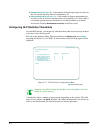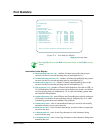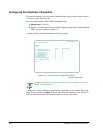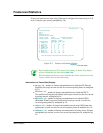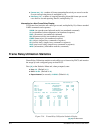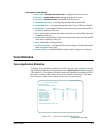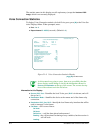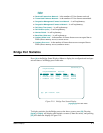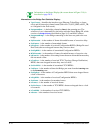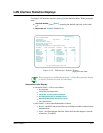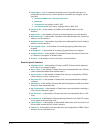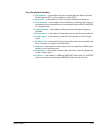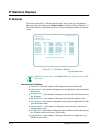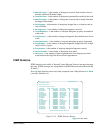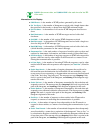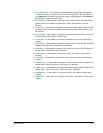
21-10 SmartSwitch 1800 4.0 User Guide, Rev 01
Information on the Status Display (the screen shown in Figure 21-9) is
described on page 20-23.
Information on the Bridge Port Statistics Display:
●
Type/Format
– identifies the interface type (Ethernet, Token Ring, or frame
relay) and (if frame relay) frame format (Native LLC2, 8025_SRB, or 8023_TB,
as configured in the Port record).
●
DesignatedRoot
– is the bridge selected as
Root
in the spanning tree. The
selection of root is determined by the bridge with the lowest Bridge ID, which
consists of a
Bridge Priority
(described on page 16-5) and MAC address.
●
DesignatedBridge
– is the bridge connecting to the least-cost path to the root
bridge.
●
DlyExceeded
– is the number of frames discarded because of excessive delay.
●
OutFrames
– is the number of transmitted frames.
●
InCfgShort
– is the number of received Configuration BPDUs (Bridge Protocol
Data Units) that were dropped because they were too short.
●
OutCfgBPDU
– is the number of transmitted Configuration BPDUs.
●
MTUExceeded
– is the number of frames discarded because of excessive size.
●
InDiscards
– is the number of incoming frames that were discarded because they
did not match a filter.
●
InTcnShort
– is the number of received TCN (Topology Change Notification)
BPDUs that were dropped because they were too short.
●
OutTcnBPDU
– is the number of transmitted TCN BPDUs.
●
FwdTrans
– is the number of times the Bridge port went from the
Learning
state
to the
Forwarding
state.
●
OutCfgDrop
– is the number of Configuration BPDUs that were dropped due to
a lack of resources.
●
InCfgBPDU
– is the number of received Configuration BPDUs.
●
OutOctets
– is the number of transmitted octets.
●
InFrames
– is the number of received frames.
●
OutTcnDrops
– is the number of TCN BPDUs that were dropped due to a lack
of resources.
●
InTcnBPDU
– is the number of received TCN BPDUs.
●
InOctets
– is the number of received octets.



